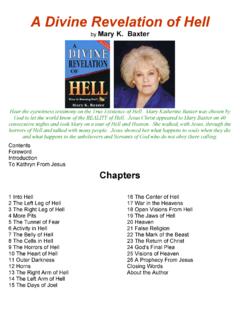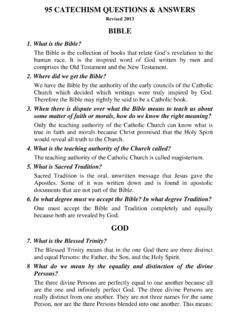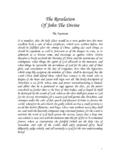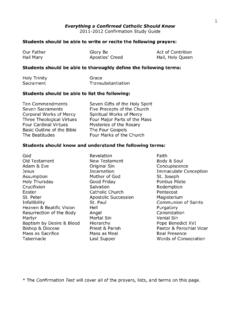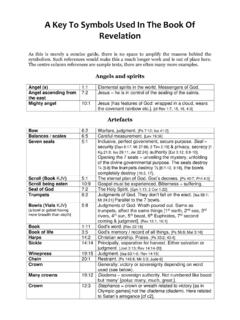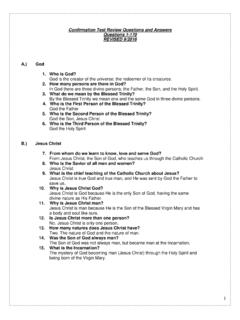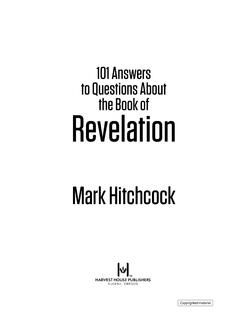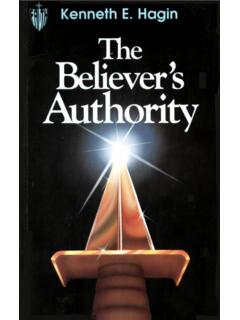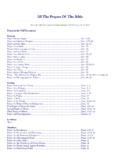Transcription of Major Bible Themes - Lewis Sperry Chafer
1 Major Bible Themes Presenting 49 Vital Doctrines of the Scriptures, Abbreviated and Simplified for Popular Use, Including Suggestive Questions on Each Topical and Textual Indices. by Lewis Sperry Chafer 1926 Lewis Sperry Chafer This book is lovingly dedicated to George C. Stebbins whose intimate companionship has for thirty years been to me an abiding inspiration and whose incomparable Gospel music like celestial wings has carried to multitudes of souls in every land the great truths of God's Word. Contents Author's Introduction Chapter 1 - The Bible : The Word of God Chapter 2 - The Bible : Inspired of God Chapter 3 - The Bible : Its Subject and Purpose Chapter 4 - God the Trinity: His Person and Deity Chapter 5 - God the Father Chapter 6 - God the Son: His Pre-Existence Chapter 7 - God the Son: His Incarnation Chapter 8 - God the Son: His Substitutionary Death Chapter 9 - God the Son: His Resurrection And Ascension Chapter 10 - God the Son: His Priestly Ministry Chapter 11 - God the Son: His Coming for His Saints Chapter 12 - God the Son.
2 His Coming with His Saints Chapter 13 - God the Holy Spirit: His Personality Chapter 14 - God the Holy Spirit: His Advent Chapter 15 - God the Holy Spirit: His Anointing Chapter 16 - God the Holy Spirit: His Ministry Chapter 17 - God the Holy Spirit: His Baptism Chapter 18 - The Dispensations Chapter 19 - The Covenants Chapter 20 - The Angels Chapter 21 - Satan: his Personality and Power Chapter 22 - Satan: his Work and Destiny Chapter 23 - Man: His Creation Chapter 24 - Man: his Fall Chapter 25 - Sin: Its Character and Universality Chapter 26 - Sin: God's Remedy for it Chapter 27 - Law and Grace Chapter 28 - Salvation from the Guilt and Penalty of Sin Chapter 29 - Salvation from the Power of Sin Chapter 30 - Four Aspects of Righteousness Chapter 31 - Sanctification 1.
3 Chapter 32 - Sanctification 2. Chapter 33 - Security Chapter 34 - Assurance Chapter 35 - The Church: Her Membership Chapter 36 - The Church: Her Mission Chapter 37 - The Sabbath Chapter 38 - The Lord's Day and the New Creation Chapter 39 - Love Chapter 40 - Prayer Chapter 41 - Service Chapter 42 - Thanksgiving Chapter 43 - Stewardship Chapter 44 - Prophecy in the Old Testament Chapter 45 - Prophecy in the New Testament Chapter 46 - Judgment of the Believer's Works Chapter 47 - Judgment of the Nations Chapter 48 - Judgment of the Wicked Chapter 49 - The Eternal Estate of the Redeemed [Top]. Author's Introduction Much of the material in this book was published in the Sunday School Times (April to December, 1925) as the author's notes on the Whole Bible Lessons.
4 Since the original series was incomplete as a representation of the more important doctrines of the Scriptures, several Chapters have been added. Those Chapters which were originally written as Bible class lessons are outlined and named according to the direction given by the lesson committee and are based on the Scripture selections suggested by them. This book is in no sense intended to be a treatise on systematic theology. In its preparation, a limited number of the most vital and practical Themes have been chosen, and an attempt has been made to adapt these brief discussions to the needs of the untrained Christian.
5 To each Chapter a list of questions has been added which, it is hoped, may make the studies more useful both to individuals and to groups. The student who would be versed on these subjects should look up every passage cited and continue the study of each theme until all the questions can be answered from memory. Although the writer presumably has made a careful study of the various subjects treated, it is not his prerogative to dictate what another shall believe; but rather to point out what the Bible teaches. Faith should always rest on a personal understanding of the Scriptures, rather than on the teaching of men.
6 Bible doctrines are the bones of revelation and the attentive Bible student must be impressed with the New Testament emphasis on "sound doctrine" (Matthew 7:28; John 7:16, 17; Acts 2:42; Romans 6:17; Ephesians 4:14; 1 Timothy 1:3; 4:6, 16; 6:1; 2 Timothy 3:10, 16; 4:2-3; 2 John 1:9-10). Not knowing the doctrines of the Bible , the child of God will be, even when sincere, "tossed to and fro, and carried about with every wind of doctrine, by the sleight of men and cunning craftiness, whereby they lie in wait to deceive"; the many well-meaning believers who are drawn into modern cults and heresies being sufficient proof.
7 On the other hand, the divine purpose is that the servant of Christ shall be fully equipped to "preach the word; be instant in season, out of season; reprove, rebuke, exhort with all longsuffering and doctrine.". These Chapters are released with the prayer that they may honor Him whose glory and grace are supreme, and that some among the children of God may be helped more accurately "to speak the things which become sound doctrine.". Lewis Sperry Chafer [Top]. Chapter 1 - The Bible : The Word of God It is a marvelous thing that we have an infallible Book from the hand of God. Every student and teacher should be fully convinced of this fact.
8 There are two lines of evidence to be traced: (1) That which is internal, or the Bible 's own claim concerning itself, and (2) that which is external, or outward, obvious facts concerning the Scriptures. I. That Which is Internal By hundreds of passages the Bible both directly declares and assumes itself to be the Word of God (note Psalm 12:6; 93:5; 119:18, 98, 99, 100, 105, 130; Isaiah 55:10, 11; Jeremiah 23:29; Romans 10:17;. 2 Timothy 2:15). Psalm 19:7-11 declares that the Old Testament is the Word of Jehovah. Six perfections of that Word are named with six corresponding transformations which that Word accomplishes.
9 Likewise, Hebrews 1:1, 2 states that God is speaking in the Old Testament through the prophets and in the New Testament through His Son. II. That Which is External Considering the external evidence that the Bible is the Word of God, the Book is a phenomenon and as such presents a challenge to the most skeptical among men. Certain facts should be noted: 1. Its Continuity The Bible appears in one volume in which there is a perfect continuity of historical sequence from the creation to the new heavens and the new earth; a perfect unfolding of doctrine from the blade to the full corn in the ear; from type to antitype; from prophecy to its fulfillment; and the anticipation, presentation, realization, and exaltation of the most perfect Person on earth or in Heaven.
10 Yet this one volume which exhibits the most perfect continuity of thought that the world has ever seen is, nevertheless, a collection of sixty-six books written by about forty authors kings, peasants, philosophers, fishermen, physicians, statesmen, scholars, poets, and plowmen who could have known but little of each other, since their lives were lived in various countries and their writings were distributed over sixty generations of human history, representing a period of about sixteen hundred years. 2. The Extent of its revelation In its unfolding of truth, the Bible is inexhaustible. Like a telescope it sweeps the universe from the heights of Heaven to the depths of hell , and traces the works of God from their beginning to their end.

